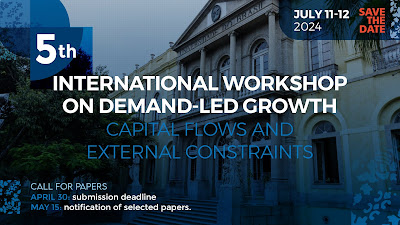The Review of of Keynesian Economics is co-sponsoring the Fifth Conference on Demand-led Growth in Rio, next July 11 and 12.2024 marks the 45th anniversary of Thirlwall’s classic 1979 paper that introduced Thirlwall’s law as well as the 75th anniversary of Prebisch’s manifesto on the main development problems of Latin America. These seminal works were key, for post-Keynesian and structuralist literatures, to put the balance of payments constraint at the center and as one of the main problems of long run growth and development. Furthermore, it was an important critique and alternative to the mainstream view that highlights factors of production scarcity as the only explanation to long run growth.As a result, many demand-led growth theories often emphasize the balance of payments as the
Topics:
Matias Vernengo considers the following as important: Demand-led Growth, ROKE, UFRJ
This could be interesting, too:
Matias Vernengo writes Paul Davidson (1930-2024) and Post Keynesian Economics
Matias Vernengo writes Paul Davidson (1930-2024)
Matias Vernengo writes My short piece on Solow and his relation to the Review of Keynesian Economics
Matias Vernengo writes Atonella Stirarti’s Godley-Tobin Lecture
The Review of of Keynesian Economics is co-sponsoring the Fifth Conference on Demand-led Growth in Rio, next July 11 and 12.
2024 marks the 45th anniversary of Thirlwall’s classic 1979 paper that introduced Thirlwall’s law as well as the 75th anniversary of Prebisch’s manifesto on the main development problems of Latin America. These seminal works were key, for post-Keynesian and structuralist literatures, to put the balance of payments constraint at the center and as one of the main problems of long run growth and development. Furthermore, it was an important critique and alternative to the mainstream view that highlights factors of production scarcity as the only explanation to long run growth.
As a result, many demand-led growth theories often emphasize the balance of payments as the main constraint that an economy faces in the long-run. Among the various subjects that balance of payments constraint literature treat, we can name: The role of financial flows in the long run; External indebtedness; Solvency and liquidity problems; Currency hierarchy; The role of the exchange rate; The relation between balance of payments constraint and economic policy, and many others.
All these themes are related with the research lines of the Group in Political Economy at the Institute of Economics of the Federal University of Rio de Janeiro, which follows the Sraffian framework proposed by Garegnani to make the Keynesian-Kaleckian principle of effective demand compatible with the classical surplus approach. For our Group, growth is demand-led and policy (often balance of payments) constrained. In succession, inflation is a cost-push political economy phenomenon dependent upon conflicting claims over income distribution. Within this framework, macroeconomic policies are fundamental to growth, inflation, and income distribution. In capitalist economies, these policies arise from institutional arrangements as well as political power relations. The Research Group in Political Economy considers that constructing policy-relevant analysis and theoretical and applied models to better understand advanced and developing countries’ actual performance demonstrates this theoretical approach’s soundness.
Given the approach taken by the Group and in the context of the intensification of dialogue and convergence among some Post-Keynesians, Kaleckians, Kaldorians, practitioners of Modern Monetary Theory, and Sraffians, the goal of the 2024 Edition of the Workshop is to strengthen this promising trend by promoting a constructive and policy-relevant debate among these strands of critical thought. Other heterodox approaches to economics are also welcome and encouraged in fostering new contributions concerning demand-led growth analyses, models, their multiplicity of relations with monetary and financial elements and external constraints to growth.
More info here.

